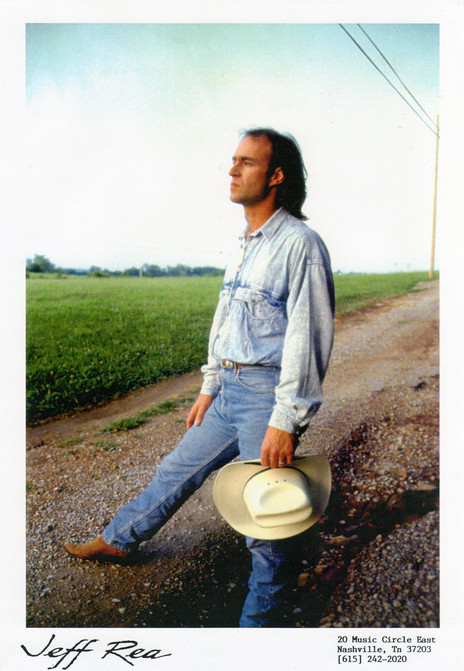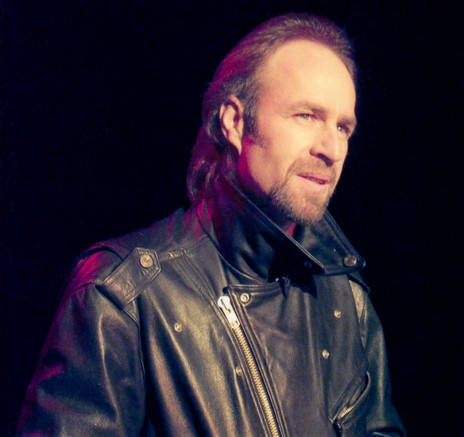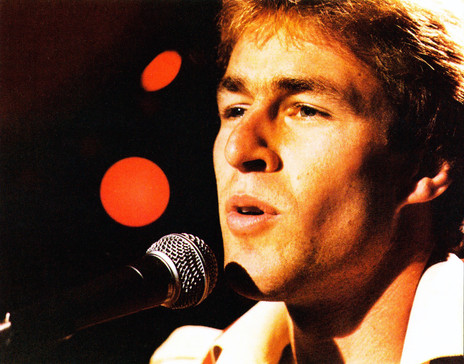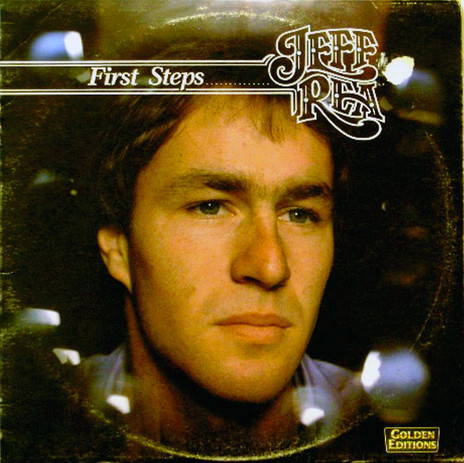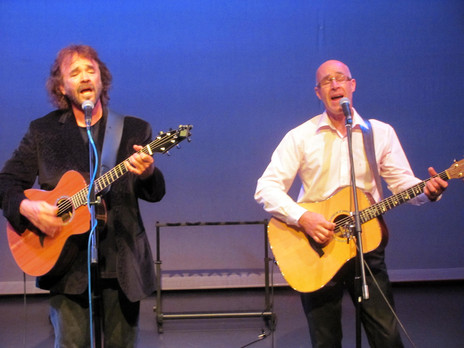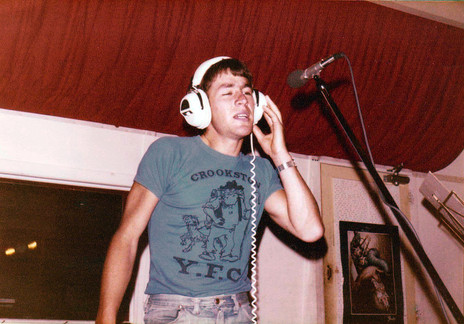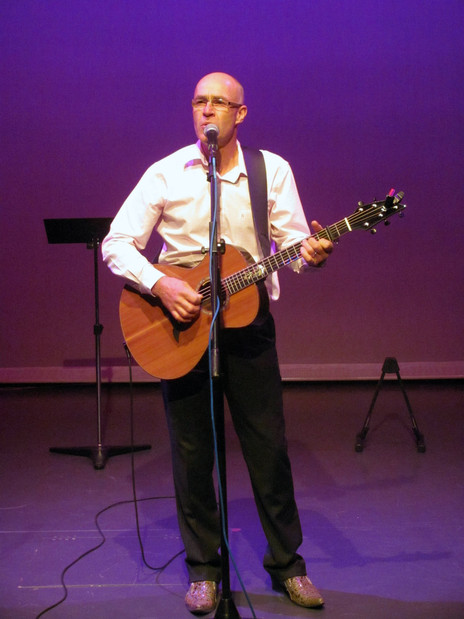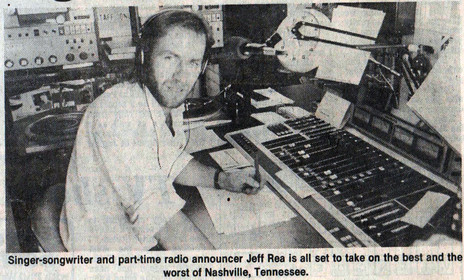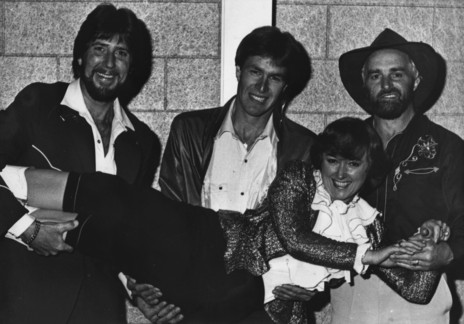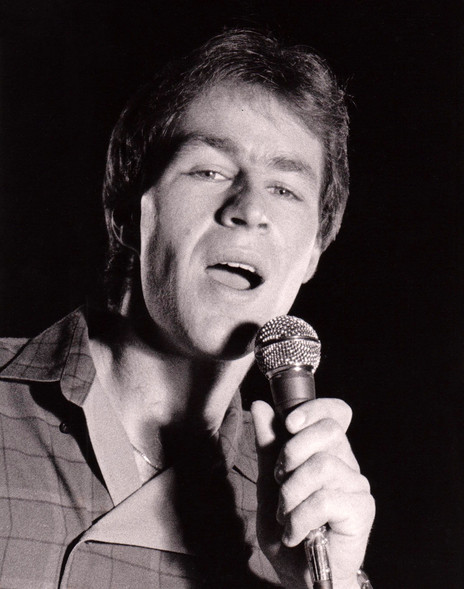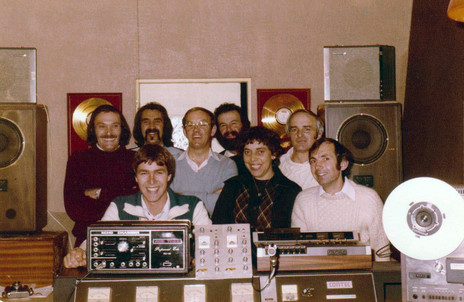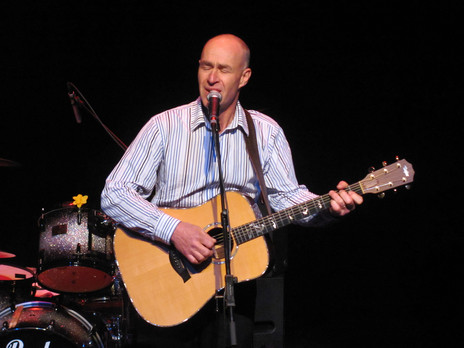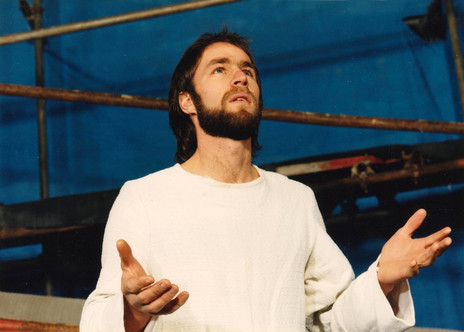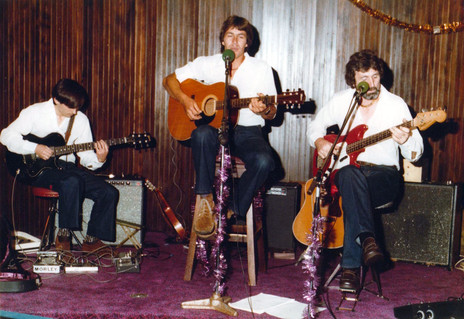During almost a decade with Morris, Jeff Rea got to work and hang out with most of the major country acts in the States as well as mainstream artists such as Kenny Loggins and Andrew Gold, and one of the biggest influences of his early years: John Denver.
Throughout close to a decade with Morris, Jeff Rea got to work and hang out with most of the major country acts in the States.
“I remember going to sleep as a teenager to his double album An Evening With John Denver, which was recorded at the Universal Amphitheatre in Los Angeles,” recalled Rea. “Well, we did a gig with John Denver in the Universal Amphitheatre in Los Angeles, you know. So, who would have thought growing up that that would happen?”
In 1995, Jeff Rea returned to the family farm in West Otago, but he has continued to join Morris every December for his US Christmas tour. “In some ways it’s the best of both worlds because we’re back and have got to bring the kids up here and I still get this three or four weeks a year to go back and do this other life that I love to do,” he said.
Since being home, he helped found the New Zealand Songwriters Trust, which has played an important role in incorporating the Best Country Song of the Year and Best Country Album of the Year awards into the Gold Guitar Awards in Gore. “Those two awards sort of got lost in the bustle of the industry awards. They wondered if they could farm them out to somewhere they would be held with a bit more respect, so we’ve ended up producing those awards as well.”
Jeffrey James Rea was born in Gore in 1959 – a son after five daughters to Crookston farmers. When he was about six, one of his sisters brought a guitar home from Dunedin Training College and Rea was encouraged to bang along on it to a stack of Beatles records. “That was the start of me having this love of music, I guess,” he recollected. “Apparently I used to sing to the shearers when they came before I went to school, but I don’t really remember that.”
He followed his sisters into piano lessons and when he was about 10 he started playing guitar with Tapanui School friend Alec Bathgate, who lived down the road. For the next three or four years the boys cut their teeth on Uriah Heep, Doobie Brothers and Black Sabbath – Rea on guitar, Bathgate on bass – and even bought their first electric guitars and amps together.
By their mid-teens they drifted apart. “We’re still friends, but we musically went in quite different directions,” said Rea. He bought his first acoustic guitar and started listening to the likes of Jim Croce, John Denver and Don McLean while Bathgate went on to become Chris Knox’s trusted ally in The Enemy, Toy Love, and Tall Dwarfs.
During his sixth form year at Gore High School, Rea discovered the school folk club, run by the physical education teacher Noel Bennett. Soon they were performing as a duo covering Simon & Garfunkel and other popular acoustic acts. Rea also met Gore musician Evan Campbell, who invited the teen to join his band, which at the time included Doug Wright, Ric Young, Selwyn Findley and Neville Copland.
For the first time, the NZ Gold Guitar Awards of 1980 had the Mataura Licensing Trust songwriting section and Campbell encouraged Rea to get serious about writing. He entered and won it with ‘Life On The Road’. “It was kind of a big deal, I suppose, in terms of a ‘maybe I can do this’ sort of thing,” he said.
He ventured north to the Tandem Recording Studio in Christchurch to lay down his debut LP First Steps with engineer Eric Johns, formerly of London disco band Heatwave, who had an international hit and NZ No.1 in 1977 with ‘Boogie Nights’. The production was a collaborative effort and all of the musicians, except former Val Elliott & The Rhythm Ramblers pedal steel guitarist Jim Lange, had played with Rea in Gore.
“Gore was pretty full of really good players in those days,” Rea said. “There were some very musical families around the district, so we had some good players.” Those who appeared on First Steps included pianist Doug Wright, guitarist Jack Klemick, bass player Stephe Copland and synth player Stu Ladbrook.
Although he had continued writing, the album included just his own ‘Life On The Road’ and ‘You’, as well as covers such as Dave Loggins’ ‘Please Come To Boston’, John Denver’s ‘I’d Rather Be A Cowboy’, Gordon Lightfoot’s ‘If You Could Read My Mind’ and Australian Mike McClellan’s ‘Song And Dance Man’. The record was picked up by Hoghton Hughes and released on his Music World and Golden Editions labels in 1982.
Rea won top prize on TV talent show Threshold Promotion Company, scoring a trip to Australian country music capital Tamworth, but it also served as a That’s Country audition of sorts. Rea had gone along as guitarist for Southland country veteran Dusty Spittle for an audition in front of TVNZ talent co-ordinator and That’s Country host Ray Columbus and singer and actor Grant Bridger.
“Dusty sang and I played and then Ray said to me, ‘Do you sing?’ I said, ‘Yeah, I sing a bit,’ and I remember I had a terrible cold; I wasn’t flash at all. But anyway, I sang for Ray and, bless his heart, poor old Dusty never got in and I did for the television show. And every time I saw Ray he would claim he spotted me.”
Jeff Rea joined the That’s Country cast in 1982, filming four or five shows each series.
So, Jeff Rea joined the That’s Country cast in 1982, filming four or five shows each series. The program starred an international guest each episode and early the following year featured Texas singer-songwriter Gary Morris, whose hit songs included ‘Headed For A Heartache’ and a pre-Beaches ‘Wind Beneath My Wings’.
Unbeknownst to Rea till much later, what initially piqued Morris’s curiosity was Rea’s featured number, the Rafe Van Hoy-penned ‘What’s Forever For’, which Morris had recorded a year earlier but had been beaten to the punch when Michael Martin Murphey released it and it became a US country No.1.
Morris suggested if Rea wanted to go to the States and have a look at the business from the ground up he should come work for him. “I’d always wondered about the possibility but I didn’t have any contacts, I didn’t know anyone,” Rea said. “That was probably the game-changer for me, really. Because we sort of hit it off from a perspective of musicality and liking a lot of the same stuff and we just got on.”
During the next year, Rea stayed in contact with Morris’s manager. After Morris returned for another That’s Country spot in early 1984, Rea followed him to the US in April, becoming a roadie and sound-truck driver and covering about 100,000 miles in the next nine months. “It was pretty full noise, but pretty amazing for a single guy, soaking it all up and just loving all the music I got to see and hear. Gary was hitting his straps and played with everybody.”
When the organisation fired the monitor engineer, Rea took over, which also brought a welcome upgrade to the tour bus. Morris’s bass player Steve Brantley was also a crack audio engineer and took Rea under his wing, showing him the ropes. “I learnt my trade from him and you got pretty good because you just got to do it all the time,” he said. “And there’s no classroom like the road. You can go to polytech as long as you want, but there’s just no classroom like the road. It was great.”
When Rea’s girlfriend Margie Miller finished her dance study in London, the couple returned to New Zealand to get married in early 1986. Their plans to return to the States were curtailed when Rea’s father suffered a serious heart attack a month before the nuptials, so they remained to look after the farm in Crookston while he recovered. Sadly, Rea Senior suffered a second heart attack 18 months later and did not survive.
“When the dust settled after all that, Gary [Morris] had scored the role of Jean Valjean in Les Misérables on Broadway – the first American to do the role – so we thought we’d go and see it,” Rea said. During the Christmas visit, Morris persuaded the Reas to give the States another shot.
Back in New Zealand, Rea made appearances on the TVNZ shows Dixie Chicken and With A Bucket On Your Head while they organised work visas and put the farm up for lease. With Morris already on the road when they returned that American summer, Rea got the job of road manager and audio engineer for neo-traditional country duo The O’Kanes on their tour with Emmylou Harris and The Nash Ramblers.
Morris signed Rea as a staff writer to his publishing company Logrhythm Music and they began writing together. Their ‘Bread And Water’ appeared on Morris’s 1989 Universal Records album Stones. They had three more cuts on Morris’s next two albums including the 1990 single ‘Miles Across The Bedroom’ which made it to only No.47 on the Hot Country Singles & Tracks chart despite a star-studded video featuring country stars Tanya Tucker, Eddie Rabbitt and Marty Stuart.
In the meantime, Jeff Rea had become part of Morris’s road band on acoustic guitar and backing vocals after proving his worth on a scaled-down Christmas tour in the early 1990s. He remained in the band until the Reas returned to the farm in Crookston in March 1995.
“It was sort of that crossroads time,” Rea said. “Our daughter was four and a half, and in terms of me getting a [recording] deal, it probably wasn’t gonna happen – I didn’t wear a hat and what I was doing wasn’t what was working or what the people were particularly interested in. But I wouldn’t have changed it for the world. It was an amazing period of our lives.
In 2000, Rea, Ross McNab and Mike Hood formed the New Zealand Songwriters Trust.
“I could have had a job with Gary probably forever, but decided that the right thing to do was to come back, and we have no regrets about doing that. At the end of it all I was running his company and writing for his publishing company, and was bandleader and playing in his band and sort of his right-hand man, really. We’re very close.”
Before departing, Rea recorded the independent album Full Circle, produced by Morris, which was a journey through his co-writes during his time in the States. It featured some of Nashville’s A-list players including guitarists Brent Rowan and Mark Casstevens, bass player Michael Rhodes and pedal steel player Dan Dugmore. “That was really cool to get all those guys in the studio and get them to bring your songs to life. That was a pretty special one,” Rea recalled.
In 2000, Rea, Ross McNab and Mike Hood formed the New Zealand Songwriters Trust to rejuvenate the MLT Songwriting Awards aspect of the Gold Guitar Awards, which Rea had been the inaugural winner of 20 years previously. In 2004, the trust took over the presentation of the APRA Best Country Song of the Year and RIANZ (now Recorded Music NZ) Best Country Album of the Year awards, to be run in conjunction with the Gold Guitar Awards.
Rea occasionally gigs in New Zealand, mostly with The Oxo Cubans from Dunedin, and continues to write as well as making the occasional threat to dust a bunch of songs off and commit to another album. Most of his time is taken up with dairy farming which he sees as just coming right after a couple of years of the bottom falling out of the market. And there are still those yearly yuletide tours stateside with Gary Morris.
